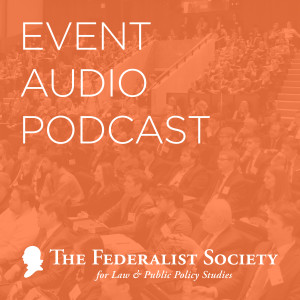
Federalist Society Event Audio
Government & Organizations

Using Judicial Processes for Political Purposes 11-19-2016
 2016-11-24
2016-11-24
Download
Right click and do "save link as"
2016 National Lawyers Convention“Those who won our independence," Justice Brandeis wrote nearly a century ago, “eschewed silence coerced by law – the argument of force in its worst form." They believed that “the fitting remedy for evil counsels is good ones." Holding that belief, the Founding Generation added an amendment to the Constitution that expressly protects the freedom of speech. Today, however, public officials and private citizens facing what they believe to be “evil counsels" have sometimes responded not by offering good counsel but by invoking judicial processes. They use “the argument of force in its worst form" to silence opinions and speech that they disapprove of. Recent examples of this phenomenon include District Attorneys in Texas and Wisconsin who investigated and charged a sitting Governor, the whistleblower who exposed the practices of Planned Parenthood, and those whose political views diverged from those of the District Attorney. In two of those cases, investigators broke into homes and seized computers and documents. Significantly, in each case, the charges were dropped, although not without great angst and effort from the targeted. Mark Steyn has asserted that the process is, itself, the punishment. Steyn has been sued by a Penn State climatologist who famously claims that he was defamed when his writings were subjected to ridicule. Four years after the suit was filed, it is still in its preliminary stages. Most recently, a coterie of Attorneys General, aided by some senators, have declared their intention to stifle dissent on the subject of climate change. The Attorneys General of Massachusetts and the Virgin Islands sent subpoenas for documents to Exxon and a number of think tanks grounding their action on the contention that the dissenters are guilty of fraud. Are these actions appropriate uses of the judicial process? What, if anything, can be done to curtail the use of judicial processes to target speech? Are measures like Anti-SLAPP (Strategic Lawsuits against Public Participation) laws an appropriate response? Are they constitutional? What about a federal anti-SLAPP law? It is noteworthy that the worst abuses have taken place in state courts. Should Congress allow removal to federal court when a defendant makes a plausible case that the relief sought would violate rights under the First Amendment?Professional Responsibility & Legal Education: Using Judicial Processes for Political Purposes 11:00 a.m. – 12:30 p.m. Chinese RoomProf. Arthur Hellman, Professor of Law, Sally Ann Semenko Endowed Chair, University of Pittsburgh School LawHon. Patrick Morrisey, Attorney General, West VirginiaProf. Patrick A. Parenteau, Senior Counsel, Professor of Law, Vermont Law SchoolMs. Kimberley A. Strassel, Wall Street Journal Editorial Board Member, Author of The Intimidation Game: How the Left is Silencing Free SpeechModerator: Hon. Steven M. Colloton, U.S. Court of Appeals, Eighth CircuitIntroduction: Mr. John J. Park, Jr., Of Counsel, Strickland Brockington Lewis LLP The Mayflower Hotel Washington, DC
view more
More Episodes
2017 Annual Supreme Court Round Up 7-13-2017
 2017-07-28
2017-07-28
 2017-07-28
2017-07-28
The State of Antitrust Enforcement 6-9-2017
 2017-06-16
2017-06-16
 2017-06-16
2017-06-16
Keynote Address by Mick Mulvaney 5-17-2017
 2017-06-07
2017-06-07
 2017-06-07
2017-06-07
Interpreting State Constitutions 3-31-2017
 2017-04-25
2017-04-25
 2017-04-25
2017-04-25
Fighting Federal Encroachment 3-31-2017
 2017-04-25
2017-04-25
 2017-04-25
2017-04-25
Convention of the States 3-31-2017
 2017-04-25
2017-04-25
 1
1
 2017-04-25
2017-04-25
 1
1
012345678910111213141516171819
Create your
podcast in
minutes
- Full-featured podcast site
- Unlimited storage and bandwidth
- Comprehensive podcast stats
- Distribute to Apple Podcasts, Spotify, and more
- Make money with your podcast
It is Free
- Privacy Policy
- Cookie Policy
- Terms of Use
- Consent Preferences
- Copyright © 2015-2024 Podbean.com




